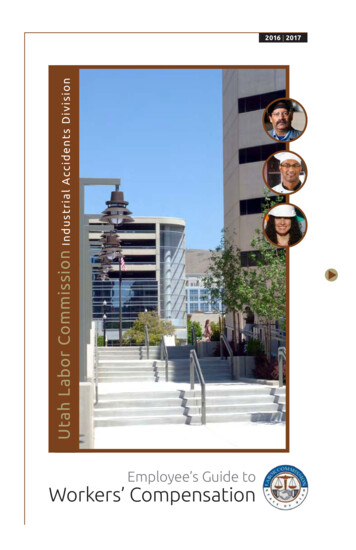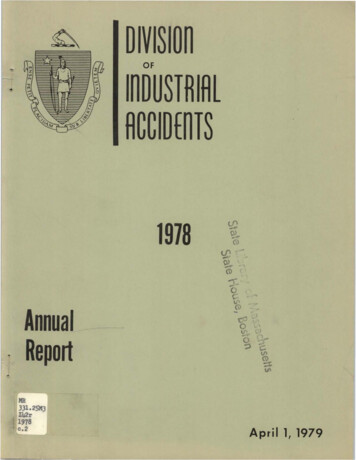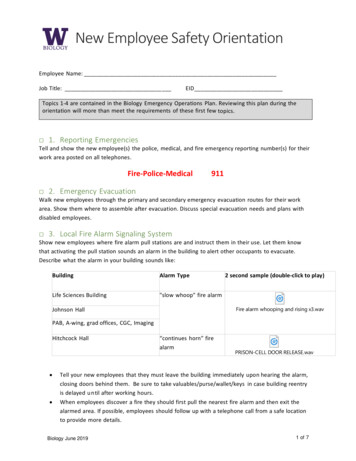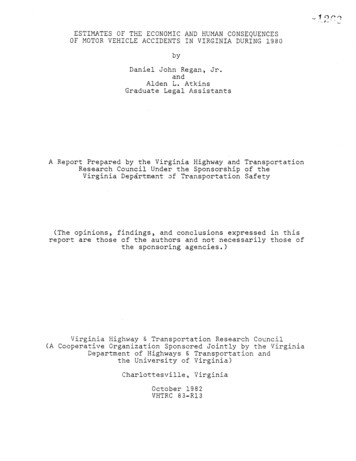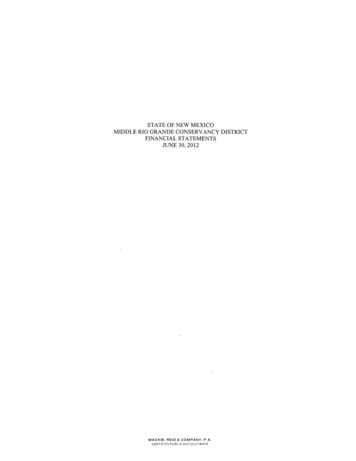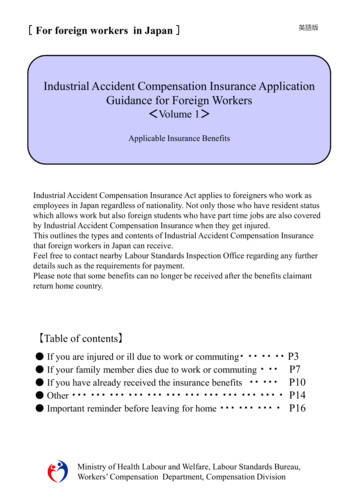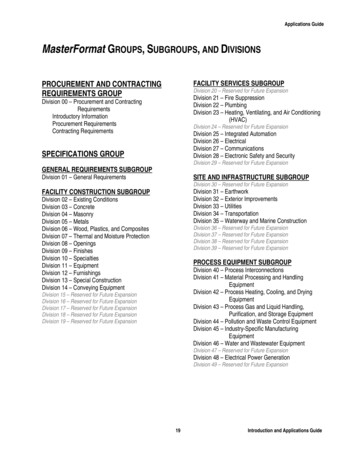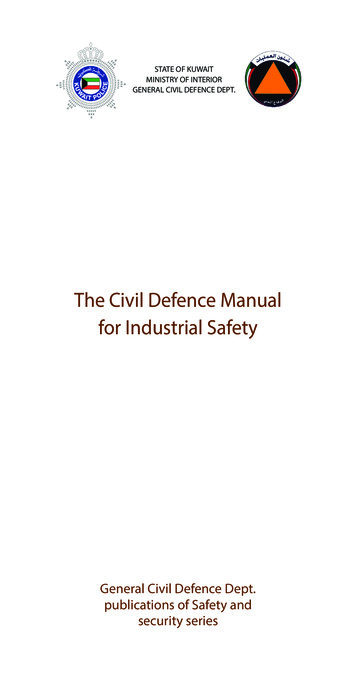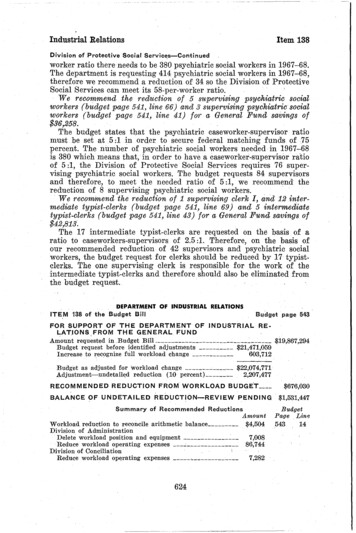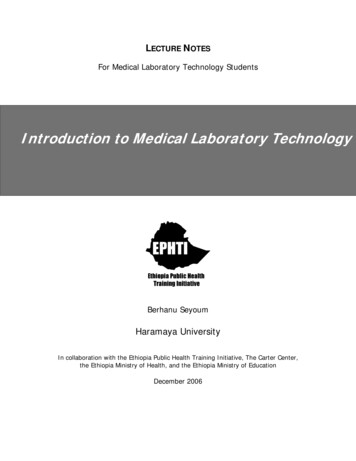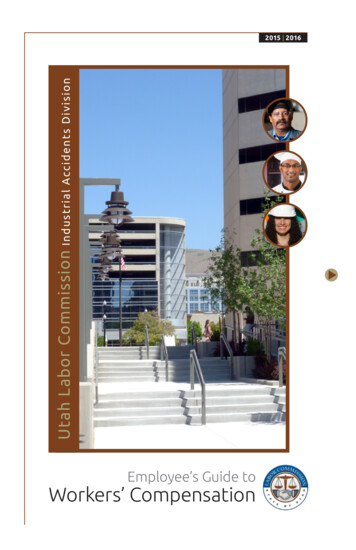
Transcription
Utah Labor Commission I n du st r ial Acc id ent s D i v ision2015 2016Workers’ CompensationEmployee’s Guide to
Utah Labor Commission has prepared thisWhat is Workers’ Compensation?4pamphlet to answer questions employeesEligibility for Workers’ Compensation Insurance5often ask about workers’ compensationReporting a Work Injury or Illness6benefits. This pamphlet gives generalWorkers’ Compensation Benefits7understanding of the workers’ compensationCan Benefits be Reduced?11Returning to Work12Medical Provider13Medical Records14Moving out of State14Re-employment Rehabilitation15Resolving Disputes17Compensation Awards18Lump Sum Settlements19Workers’ Compensation Fraud19Conclusion20system. If you need more information or havespecific questions, please contact us at:Industrial Accidents Division(801) 530-6800Toll Free(800) 530-5090Toll Free In State(800) 222-1238Email laborcom@utah.govwww.laborcommission.utah.gov2Ut ah L abor Commis sionThe Industrial Accidents Division of theEmployee’s Guideto Workers’ CompensationI n dust r ial Acc id ent s D i v isio nw w w. l a b o r c o m m i s s i o n . u t a h . g o vE m p l o y e e’s G u i d e t o W o r k e r s ’ C o m p e n s a t i o n3
E m p l o y e e’s G u i d e t o W o r k e r s ’ C o m p e n s a t i o nWhat is Workers’ Compensation?Q 1. What is workers’ compensation?orkers’ compensation is a no-fault insurance systemA Westablishedby the Utah Legislature in 1917. It paysmedical expenses and helps offset lost wages foremployees with work-related injuries or illnesses.Q 2. Who provides workers’ compensation coverage?our employer does, by purchasing workers’A Ycompensationinsurance or obtaining permission from theIndustrial Accidents Division to “self-insure.”Q 3. Who pays for workers’ compensation coverage?A Your employer. The cost cannot be deducted from your wages. 4 . Are all employers required to have workers’Q compensationcoverage?lmost all employers must have workers’ compensationA Acoverage.There are limited exceptions for real estateand insurance sales, certain small agricultural operations,household domestic work and occasional “casual”employment.w w w. l a b o r c o m m i s s i o n . u t a h . g o vEligibility forWorkers’ Compensation Insurance. How long do I have to work at a job before I amQ 6protectedby the workers’ compensation system?rotection begins as soon as you start work. You areA Pentitledto workers’ compensation benefits for workinjuries and illnesses even if you have been on the job onlya short time, or only work part-time. 7. Can my claim be denied because I was at faultQ forthe injury?o. Workers’ compensation is a no-fault system. However,A Nworkers’compensation does not cover intentional selfinflicted injuries. Disability compensation (but not medicalbenefits) may be denied for injuries from alcohol or drugabuse. Also, disability compensation can be reduced by15% for willful failure to use safety devices or followsafety rules.Note: Disability compensation can also be increased by 15%if an injury results from an employer’s willful failure to followsafety rules.I find out who the workers’ compensationQ insurance 5. How docarrieris for my employer?our employer is required to post its workers’A Ycompensationinsurance carrier’s address and phonenumber at its employment site, or indicate that it isself-insured. You can also obtain this information byClicking here then clicking on the “Compcheck” link orby calling the Industrial Accidents Division.45
w w w. l a b o r c o m m i s s i o n . u t a h . g o vE m p l o y e e’s G u i d e t o W o r k e r s ’ C o m p e n s a t i o nReporting a Work Injury or IllnessWorkers’ Compensation BenefitsWhat should I do if I’m injured at work or developQ a 8.work-relatedillness?the injury or illness to your employer immediately.A RIfeportyou fail to report an injury or illness within 180 days,1 2. What benefits does the workers’ compensationQ systemprovide?epending on your specific circumstances,A Dworkers’compensation can pay one or more of theyou may be disqualified from receiving workers’compensation benefits.Q 9 . How do I report my injury or illness?can use any method to report your injury or illnessA Ytoouyouremployer. It is a good idea to make sure yourreport is documented.What happens after I report my injuryQ 1 or0.illness?our employer has 7 days to report the claim to itsA Yinsurancecarrier and the insurance carrier has 7 daysto report the “First Report of Injury” to the IndustrialAccidents Division. Your employer or its insurance carriermust give you a copy of the report.Is my doctor required to report my injuryQ 1 or1.illness?our doctor is required to complete a “Physician’s InitialA YReportof Injury or Illness” (Form 123) and submit thereport to the Industrial Accidents Division within 7 days ofyour first visit. Be sure and explain to your physician HOW,WHEN and WHERE the injury or illness occurred. Theinjured worker can request a copy of the Form 123 fromthe medical provider.following benefits. Medical Care is the reasonable expense of medicalcare necessary to treat your work injury or illness. Thisincludes visits to your doctor, hospital bills, medicine andprosthetic devices. It also includes reimbursement forthe cost of travel to receive medical treatment. Except asexplained in answer to Question 27, you are not liable forany cost of this medical care.Temporary Total Disability Compensation is paid for thetime you cannot work because of a work injury or illness.However, no compensation is paid for the first 3 days afteran injury or illness unless the disability prevents you fromworking for more than a total of 14 days. In that case,you will be paid for the first 3 days of disability. This typeof compensation ends when you return to work or reachmedical stability.Temporary Partial Disability Compensation is paid ifyour work injury or illness prevents you from earning yourfull regular wage while you are recovering. For example, ifyou work fewer hours or work at a light-duty job that paysless than your regular job, you are entitled to temporarypartial disability compensation in addition to your wages.Continued on the next page67
w w w. l a b o r c o m m i s s i o n . u t a h . g o vE m p l o y e e’s G u i d e t o W o r k e r s ’ C o m p e n s a t i o nPermanent Partial Disability Compensation is paid ifyour work injury or illness leaves you with a permanentimpairment. This compensation begins when your doctordetermines that you have reached medical stability; theduration of this compensation is determined according toan “impairment rating” provided by your physician.Permanent Total Disability Compensation is paid if yourwork-related injury or illness leaves you with a permanentdisability that prevents you from returning to your formerwork or performing any other work that is reasonablyavailable to you.Note: If you are totally disabled, you may also be eligible for SocialSecurity disability benefits.Benefits in case of death. If an employee dies from awork injury or illness, workers’ compensation will payup to 9,000 for funeral and burial expenses. Also, thedeceased worker’s spouse, dependent children, and otherdependents may be entitled to monthly payments.Qthe doctor to explain it to you. If you disagree, youA Acansk seeka second opinion. However, the insurance13. What if I disagree with an impairment rating?carrier is not obligated to authorize, pay for, or accept asecond opinion.Q 14. Can a chiropractor give me an impairment rating?es. Chiropractors can give impairment ratings on injuriesA Ywithinthe scope of their medical expertise.8Q 15. When do workers’ compensation benefits begin?n insurance carrier or self-insured employer has 21 daysA Aafterlearning of your work injury or illness to either: 1)begin payment; 2) deny your claim; or 3) notify you thatfurther investigation is required. If further investigation isnecessary, the insurance carrier or self-insured employerhas an additional 24 days to accept or deny your claim. Ifyour claim is accepted, checks for disability compensationare usually issued every two weeks.Q 16. How much will I receive while I am unable to work?emporary total disability is computed at two-thirds ofA Tyourpre-injury weekly wage, plus 5 for your spouse and 5 each for up to four dependent children. The maximumamount of your temporary total disability compensationcannot exceed the Utah average weekly wage issued byUtah Department of Workforce Services.Other types of workers’ compensation disabilitypayments are computed somewhat differently. Formore information regarding the maximum and minimumdisability compensation rates, contact your workers’compensation carrier or visit the Benefits Guides sectionof the Division of Industrial Accident’s website byClicking here and Clicking here.7. What if I work two jobs, and a workplace injury orQ 1illnessfrom one job also prevents me from working atmy second job?ages lost from the second job may be included inA Wcomputingthe amount of your disability compensation.9
w w w. l a b o r c o m m i s s i o n . u t a h . g o vE m p l o y e e’s G u i d e t o W o r k e r s ’ C o m p e n s a t i o nQ 18. How long will I receive disability compensation?ou will receive temporary total disability compensationA Yuntilyou can return to your regular work, your employeroffers you suitable light-duty work, or you reach medicalstability. The maximum duration for temporary totaldisability compensation is 312 weeks within a 12 yearperiod of time from the date of injury. Note: If you have a permanent impairment after your temporarytotal disability compensation ends, you may be entitled to anadditional award of permanent disability compensation. 19. Am I compensated for time and travel forQ medicaltreatment?ou may be paid temporary total disability benefits forA Ytimeaway from work for necessary medical care. You maybe entitled to reimbursement for the expense of yourtravel to receive medical treatment.0. Do my health care benefits continue at workQ 2whileI’m unable to work and receiving workers’compensation benefits?he Workers’ Compensation Act does not requireA Temployersto continue paying for health insurance whileyou are off work. However, you should talk to youremployer about the Family and Medical Leave Act (FMLA)to see if it applies to you.Note: FMLA is a federal law requiring some employers toprovide up to 12 weeks of unpaid job protected leave to eligibleemployees for certain family medical reasons. You may be eligibleif you worked for a covered employer at least 1,250 hours overthe previous 12 months. Click here2 1. How long am I entitled to medical care for my workQ injuryor illness?here is no time limit to your right to receiveA Tmedicalcare necessary to treat your work injury orillness. However, the provider is required to submit a billfor services to your workers’ compensation insurancecompany within one year from the date of the treatment.Can Benefits be Reduced? 22. Can anything be deducted from my workers’Q compensationcheck?orkers’ compensation disability payments are notA Wtaxableand cannot be garnished to pay debts except forchild support.Can my disability compensation be reducedQ or2 3.terminated?without permission from the Labor Commission.A NotPermission can be granted in the following circumstances:Temporary Disability Compensation: The Commissionmay authorize reduction or termination of temporarydisability compensation if you are terminated fromsuitable light-duty work for: 1) criminal conduct;2) violent conduct; 3) violation of workplace health, safety,licensure, or nondiscrimination rules; or 4) failing a drug oralcohol test.Continued on the next page1011
w w w. l a b o r c o m m i s s i o n . u t a h . g o vE m p l o y e e’s G u i d e t o W o r k e r s ’ C o m p e n s a t i o nPermanent Total Disability Compensation: TheCommission may terminate a preliminary award ofpermanent total disability compensation if you areunable to work solely due to 1) incarceration; or 2) legalineligibility to work. The Commission may terminate afinal award of permanent total disability compensation ifyou are no longer totally disabled.Note: Even if your disability compensation is terminated, you arestill entitled to medical benefits.Returning to WorkQ 24. When can I go back to work?ou can return to work when you are able to do so. YouA Yshouldconsult with your physician and obtain a light-dutyor full-duty work release.Can I refuse an offer of light-duty work fromQ 2my5.employer?ot without a good reason. If your employer offersA Nsuitablelight-duty work, you are required to acceptthe work or risk losing your temporary disabilitycompensation.2 6. What if my doctor says I can perform light-dutyQ workand my employer does not have light-duty workavailable?f your employer does not offer light-duty work, you areA Ientitledto continue receiving temporary total disabilityMedical Provideremployer or its insurance carrier require meQ 2 to7.goCanto mya specific doctor or hospital for treatment?nly for the first visit. Specifically, if your employer orA Oinsurancecompany has notified you of a “preferredprovider organization” (PPO), you must go there for yourfirst medical treatment; if you do not, you may be liablefor part of the initial treatment cost. But after your firstvisit to the PPO, you can obtain treatment from themedical provider of your choice.If you have not been notified of a PPO, you can obtainyour initial medical treatment from the provider ofyour choice. Remember to choose a medical provider thataccepts workers’ compensation cases.Q 2 8. Can I change medical providers?ou can change medical providers one time. You mustA Ynotifyyour workers’ compensation insurance carrier ofthe change. After the one time change has been exercisedby the injured worker, any subsequent change of providerwould need to be approved by the payor. A referral fromone medical provider to another is not considered achange of medical providers.Q 29. Can I choose a chiropractor as my medical provider?es, but chiropractic treatment after the initial 8 visitsA Ymustbe pre-authorized by the insurance carrier.compensation benefits until a doctor finds you are atmedical stability or you exhaust your 312 week entitlement.1213
E m p l o y e e’s G u i d e t o W o r k e r s ’ C o m p e n s a t i o nMedical Records3 0. Am I required to release my medical records to myQ employeror insurance company?ecause medical records are necessary to evaluate andA Badministerworkers’ compensation claims, workers’compensation insurance carriers and claims administratorsof self-insured employers are generally entitled to 10 yearsof past medical records. Your employer is not entitled tothese records.More restrictive rules apply to records from psychiatrists,psychologists, obstetricians, or related to reproductiveorgans. You are required to release these types ofrecords only if you are claiming workers’ compensationbenefits for these conditions or have signed a release forthose records.Moving out of StateQ 3 1. Am I entitled to benefits if I move out of state?es, but you must submit both: 1) an “Employee’sA YNotificationof Intent to Leave State” (Form 044); and2) an “Attending Physician’s Statement” (Form 043) thathas been completed by your Utah physician. Both Form044 and Form 043 need to be submitted together. Theseforms are available at www.laborcommission.utah.gov.Note: Even if you move to another state, the amount that willbe paid for medical care of your work injury or illness will still besubject to the Utah Labor Commission’s medical fee rules.14w w w. l a b o r c o m m i s s i o n . u t a h . g o vRe-employment Rehabilitation3 2. Can my employer discharge me if I can’t return toQ workdue to a job injury or illness?Utah Workers’ Compensation Act does not prohibitA Tanheemployerfrom discharging an injured worker if theworker can no longer perform his or her job. However: Your employer cannot retaliate against you for filinga workers’ compensation claim. In Touchard v. La-ZBoy, Inc., 148 P.3d 945 (Utah 2006), the Utah SupremeCourt held that an employee who has been fired orconstructively discharged in retaliation for claimingworkers’ compensation benefits can sue the employerfor wrongful discharge. Termination of an injured worker who is capable ofperforming the essential functions of his or her workmay violate the Utah Antidiscrimination Act and theFederal Americans with Disabilities Act (ADA). ote: For more information about these Acts, contact theNLabor Commission’s Antidiscrimination Division, (801) 530- 6801or toll free (800) 222-1238.3 3. What happens when my doctor releases me to workQ butI can’t do the job I was doing when I was injured?f your doctor has determined that you have a permanentA Iimpairmentfrom your work injury or illness, you areentitled to permanent partial or permanent total disabilitycompensation. Also, you should check with your employerto see if there is a different job you can do that is withinyour capabilities.15
w w w. l a b o r c o m m i s s i o n . u t a h . g o vE m p l o y e e’s G u i d e t o W o r k e r s ’ C o m p e n s a t i o n 34. If my employer does offer me a different positionQ withinmy capabilities, am I entitled to the same wageI was earning before I was injured or ill? o. Your employer may pay you at the new position’sA Nwagerate. You may be eligible for an award of temporarypartial disability compensation to help offset thedifference between your old and new wage rates.Is my employer required to provide a new jobQ or3 5.retrainme?o, but you may be eligible for rehabilitation servicesA Nthroughthe Utah State Office of Rehabilitation.The Utah State Office of Rehabilitation phone number is1-800-473-7530.6. Can I receive unemployment benefits while onQ 3 workers’compensation?ou are not eligible for unemployment benefits whileA Yreceivingtemporary total disability compensation orpermanent total disability compensation. You may beeligible for unemployment benefits while receivingpermanent partial disability compensation if you are ableand available for full-time work and can reasonably expectto obtain work despite your disability. Once you havereached medical stability from your work injury or illnessand are released to go back to work, you have 90 days toapply for unemployment benefits.Questions about unemployment insurance benefitsshould be directed to the Department of WorkforceServices at (801) 526-4400 or toll free (888) 848-0688.Resolving DisputesQ 3 7. What do I do if my claim is denied?irst, talk with your workers’ compensation claimsA Fadjusterto find out why the claim has been denied. Youmay be able to provide additional information and resolvethe problem. If the insurance carrier continues to denyyour claim, you can ask the Industrial Accidents Divisionfor assistance. But if these efforts do not resolve thedispute and you still believe you are entitled to workers’compensation benefits, you can file an Applicationfor Hearing with the Labor Commission’s AdjudicationDivision. A mediation may be held in an attempt tosettle the claim. If the claim cannot be settled throughmediation, an Administrative Law Judge will then hold ahearing and issue a decision on your claim.Q 38. Do I need an attorney?ou are not required to hire an attorney, although you mayA Ydecideto do so. The Industrial Accidents Division has staffavailable to explain your rights under the Utah Workers’Compensation Act. In deciding whether you want to hirean attorney, you should review the publication “Employees’Guide to Appealing a Workers’ Compensation Claim Denial”,available on-line Click here.Q 39. If I do hire an attorney, how is my attorney paid?n most cases, the Commission requires your attorney to acceptA Ipaymenton a “contingency” basis - the attorney is entitledto payment only if you prevail on your claim. The Commissionalso regulates the amount of fees. Labor Commission RuleR602-2-4 sets attorneys’ fees. For more informationClick here.Continued on the next page1617
E m p l o y e e’s G u i d e t o W o r k e r s ’ C o m p e n s a t i o nIf you are claiming medical benefits, and less than 4,000in disability compensation is involved, the insurance carrieror self-insured employer may be required to pay yourattorney’s fees. If your claim involves more than 4,000in disability compensation, your attorney’s fee will bededucted from your disability compensation.0. If the workers’ compensation carrier denies myQ 4claim,can I have my health insurance company pay formy medical treatment?es. You may file an application for hearing and on theA Yapplication,you can fill out the Coordination of Benefitssection providing your private health insurance information.The Adjudication Division would then send a notice to yourprivate health insurance letting them know of their duty topay. The medical claims would be paid at the same extentit would be if your accident or injury weren’t related towork. In other words, if your private health insurance policydoesn’t normally cover certain procedures or expenses, it’snot obligated to cover those expenses just because youclaim that accident or injury is related to work. You will alsobe responsible for any co-pays or deductibles you wouldotherwise be obligated to pay.Compensation AwardsWhat is a “Permanent Partial Disability StatementQ of 41.Compensation”(Form 219)?statement of compensation is used to record theA Ainjuredworker and insurance carrier’s understanding ofthe amount of temporary disability compensation andpermanent partial disability compensation that is due fora work injury or illness.18w w w. l a b o r c o m m i s s i o n . u t a h . g o vLump Sum Settlements 42. Can my disability compensation be paid to me all atQ oncein a “lump sum?”nly with prior approval from the Labor Commission. TheA O“Applicationfor Lump Sum or Advanced Payment” (Form134) can be obtained at www.laborcommission.utah.gov.If a lump sum payment is approved, the amount will bereduced to its discounted present value.3. Am I allowed to compromise or settle my workers’Q 4compensationclaim?nly with prior approval from the Labor Commission. IfA Oa compromiseor settlement is approved, it is final - youwill not be able to claim additional benefits at a latertime. Proposed compromises and settlements mustbe submitted in advance to the Labor Commission’sAdjudication Division for review. Some orders do allowadditional medical and wages to be paid. For differencebetween Permanent Partial Disability Statement ofCompensation vs Full and Final Settlements Click here.Workers’ Compensation Fraud4. Is it against the law to claim workers’ compensationQ 4benefitsthat I know I’m not entitled to?nder Utah law, a fraudulent workers’ compensationA Uclaimfor compensation or medical benefits is a crime andany employee found guilty of fraudulently receiving thesebenefits is subject to fines and incarceration.19
E m p l o y e e’s G u i d e t o W o r k e r s ’ C o m p e n s a t i o nConclusionThis guide is intended to provide general information regardinginjuries on the job. If you have any additional questions orproblems with your workers’ compensation claim, ask youremployer or its workers’ compensation insurance carrier, orcontact us at:Utah Labor CommissionIndustrial Accidents Division(801) 530-6800Toll Free In State(800) 222-1238Email laborcom@utah.govAdditional copies of the “Employee’s Guide to Workers’ Compensation” maybe obtained by phone or on the Internet at: www.laborcommission.utah.govSalt Lake City OfficeHeber Wells Office Building, 160 East 300 South, 3rd FloorPO Box 146600 Salt Lake City, Utah 84114-6600St George Office AdjudicationsBlackridge Terrace Office Building 1, Suite 3041173 South 250 West, St George Utah 84770Price Office Coal Mine Safety and CertificationsUtah State University Eastern, Western Instructional Building451 East 400 North, Rooms 135 and 137, Price, Utah 84501(801) 530-6800 Toll free instate: (800) 530-5090www.laborcommission.utah.gov20
Industrial Accidents Division (801) 530-6800 Toll Free (800) 530-5090 Toll Free In State (800) 222-1238 Email laborcom@utah.gov www. laborcommission. utah.gov Utah Labor Commission Industrial Accidents Division
